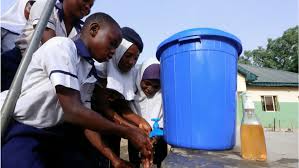The federal government has launched the Water Sanitation and Hygiene Committees (WASHCOMs) report which will serve as a guide for the implementation of WASH services in local communities.
Launching the report on Tuesday in Abuja, the Minister of Water Resources and Sanitation, Prof. Joseph Terlumun Utsev, said WASHCOM, a community-based association is set up to oversee the issues of WASH services delivery and management as well as promote positive behavior change among users.
Utsev said the development of framework for WASHCOM formation, training and management in Nigeria was borne out of the need to forestall frequent breakdown and abandonment with focus on ensuring WASH facilities sustainability in Nigeria and attainment of the SDs targets 6.1 & 6.2.
He said issues affecting progress in the sector include national and sub-national structure for WASH service delivery, WASH sector institutional structural and governance models.
According to him, the 2021 WASHNORM report revealed that there are 2,313,566 water points in Nigeria, with about 60% located in rural areas and 40% in urban areas. 62 % were found to be functional nationwide as at the time of the survey while 38% were broken down.
“The predominant reasons for the non-functionality of WASH systems were attributed to the absence of ownership, poor deployment of technology options, lack of viable operations and maintenance (O&M) system, inadequate tariff systems for cost recovery and sparse community participation and accountability.
“Inefficiency in management and continued dependency on government for operation and maintenance or on an individual in financing the maintenance of water services continues to plague the provision of climate-resilient, adequate and safely managed WASH services across the country. This led to the institutionalization of WASHCOM at community level.
“This event marks another important milestone in our collaborative efforts at sustaining the provision of Water Supply, Sanitation and Hygiene facilities and services in Nigeria,” he said.
He said given the desire to expand access and quality to WASH services at community level in all Local Government Areas of the country, it became obvious that sustainability of WASH services in the rural communities may not be achieved unless the systems for community management as well as community institutions are properly formed, trained and supported for sustainable management.




